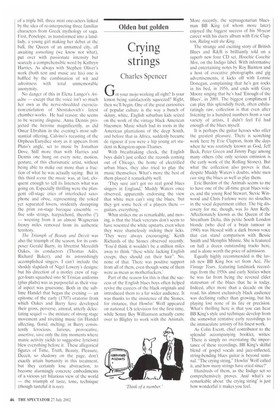Crying strings
Charles Spencer
Got your mojo working all right? Is your lemon being satisfactorily squeezed? Right, then we'll begin. One of the great curiosities of popular culture is the way a bunch of skinny, white, English suburban kids seized on the work of the vintage black American bluesmen. Music which had its roots in the American plantations of the deep South, and before that in Africa, suddenly became de rigueur if you were a hip young art student in Kingston-upon-Thames.
With breathtaking cheek, the English boys didn't just collect the records coming out of Chicago, the home of electrified urban blues, they also tried to play the music themselves. What's more the best of them played it remarkably well.
'They sure ain't got no real good blues singers in England,' Muddy Waters once observed, apparently endorsing the view that white men can't sing the blues, 'but they got some heck of a players there — guitars, everything.'
What strikes me as remarkable, and moving, is that the black veterans don't seem to have resented the white upstarts, even when they were shamelessly nicking their licks. 'They were always encouraging,' Keith Richards of the Stones observed recently. 'You'd think it wouldn't be a million miles away to think "these white fucking English creeps, they should cut their hair". No, none of that. There was positive support from all of them, even though some of them were as mean as rnotherfuckers.'
Part of the reason for this is that the success of the English blues boys often helped revive the careers of the black originals and introduced them to a far wider audience. It was thanks to the insistence of the Stones, for instance, that Howlin' Wolf appeared on national US television for the first time, while Sonny Boy Williamson actually came over to Blighty to work with the Animals. More recently, the septuagenarian bluesman BB King (of whom more later) enjoyed the biggest success of his 50-year career with his duets album with Eric Clapton, Riding with the King.
The strange and exciting story of British Blues and R8z13 is brilliantly told on a superb new four CD set, Hoochie Coochie Men, on the Indigo label. With informative and entertaining notes by Roy Bainton and a host of evocative photographs and gig advertisements, it kicks off with Lonnie Donegan, complaining that he's got rocks in his bed, in 1956, and ends with Gary Moore singing that he's had 'Enough of the Blues', in 2001. The biggest compliment I can play this splendidly fresh, often exhilaratingly raw, collection is that even after listening to a hundred numbers from a vast variety of artists, I didn't feel I'd had enough of the blues myself.
It is perhaps the guitar heroes who offer the greatest pleasure. There is scorching work here by Eric Clapton, from the days when he was routinely known as God, Jeff Beck, Peter Green and Jimmy Page among many others (the only serious omission is the early work of the Rolling Stones). But what the collection also proves is that, despite Muddy Waters's doubts, white men can sing the blues as well as play them, Eric Burdon of the Animals seems to me to have one of the all-time great blues voices, and the young Rod Stewart, Stevie Winwood and Chris Farlowe were no slouches in the vocal department either. The big discovery for me, though, was Jo Ann Kelly. Affectionately known as the Queen of the Streatham Delta, this petite South London blonde (who died of a brain tumour in 1990) was blessed with a dark brown voice that can stand comparison with Bessie Smith and Memphis Minnie. She is featured on half a dozen outstanding tracks here, and is alone worth the price of admission.
Equally highly recommended is the lavish new BB King box set from Ace, The Vintage Years. featuring landmark recordings from the 1950s and early Sixties when he was far from being the revered elder statesman of the blues that he is today. Indeed, after more than a decade on the road, his almost exclusively black audience was declining rather than growing, but his playing lost none of its fire or precision. What's thrilling here is that you can hear BB King's style and technique develop from the somewhat tentative early recordings to the immaculate artistry of his finest work.
As Colin Escott, chief contributor to the splendid accompanying booklet, writes: 'There is simply no overstating the importance of these recordings. BB King's skilful blend of gospel vocals and jazz-inflected, string-bending blues guitar is beyond seminal. "The crying string," Howlin' Wolf called it, and how many strings have cried since?'
Hundreds of them, as the Indigo set so comprehensively proves. And what's so remarkable about 'the crying string' is just how wonderful it makes you feel.
































































 Previous page
Previous page